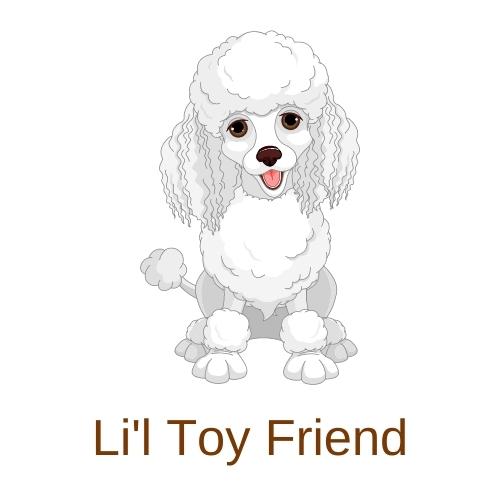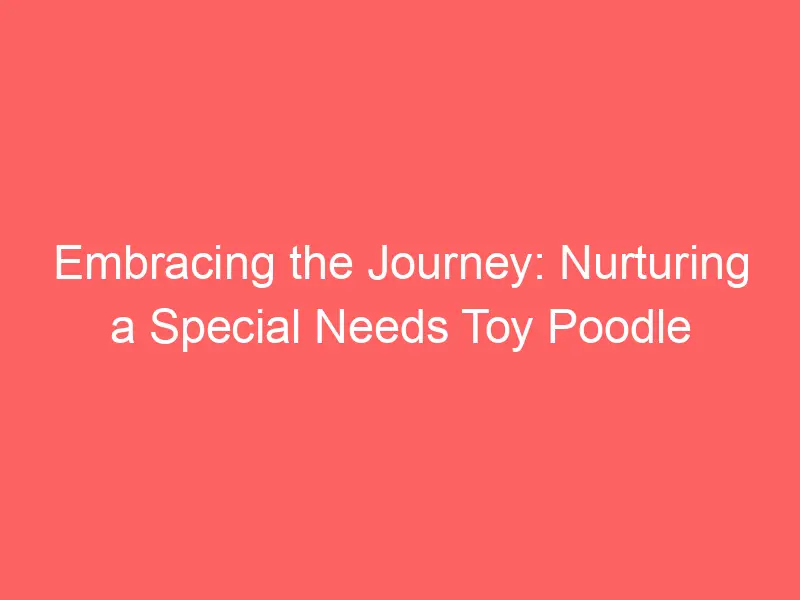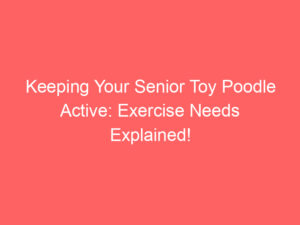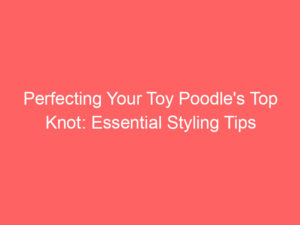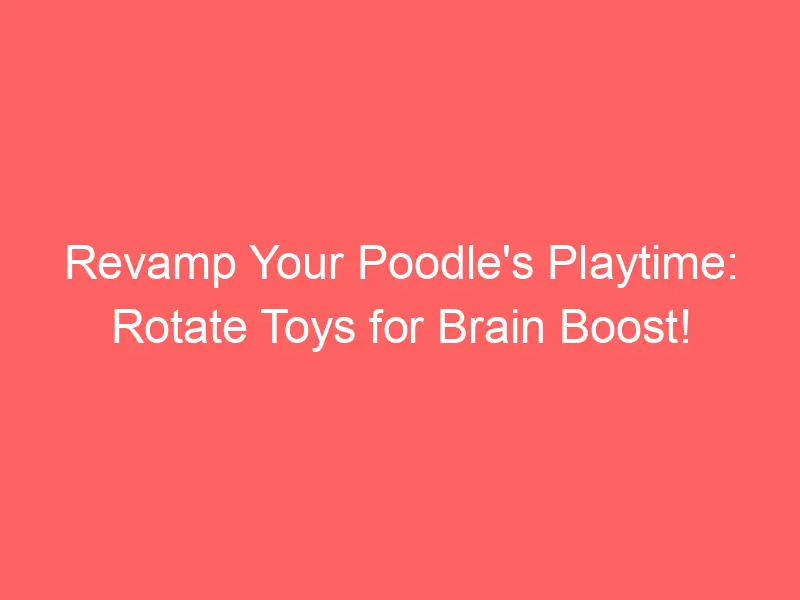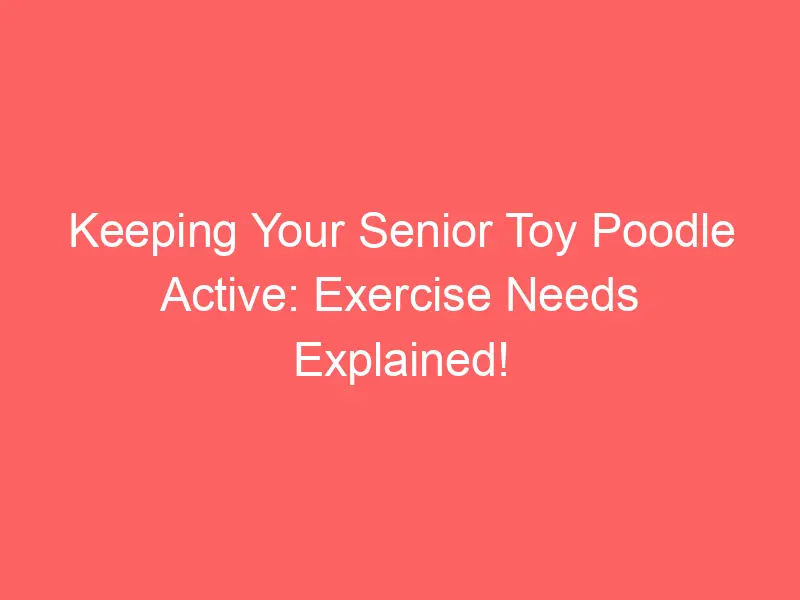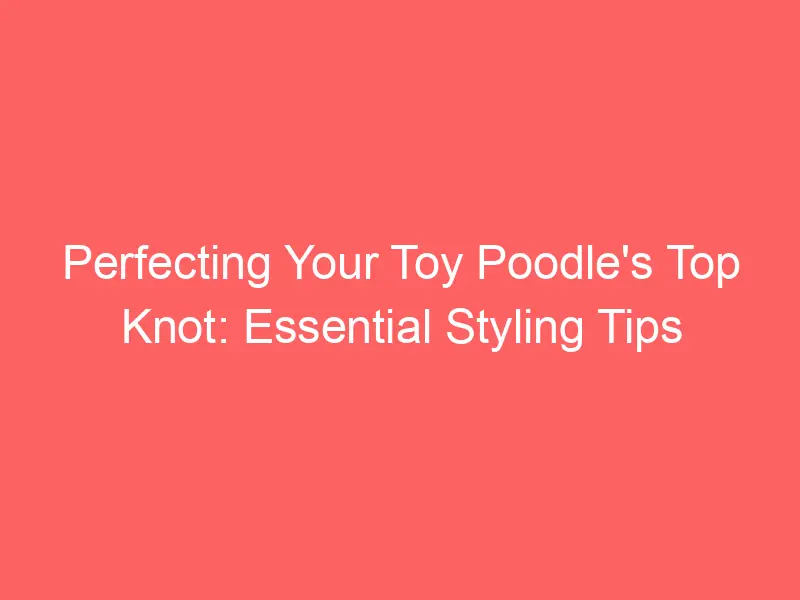
Introduction to Special Needs Toy Poodle Care
When it comes to the care and nurturing of special needs toy poodles, understanding their unique needs and embracing the journey of their care is of utmost importance. This journey, filled with both joy and challenges, can be a rewarding experience for any poodle lover.
- Understanding the unique needs of a special needs toy poodle
- Embracing the journey: The joy and challenges of caring for a special needs toy poodle
Special needs toy poodles may have a variety of health issues, ranging from physical disabilities to chronic illnesses. These dogs require a different level of care compared to other dogs. Their diet, exercise, and medical care need to be tailored according to their specific needs. For instance, a toy poodle with a physical disability may require a special diet to maintain its weight and a customized exercise routine to keep its muscles strong. Understanding these needs is the first step towards providing the best care for your special needs toy poodle.
Caring for a special needs toy poodle is a journey filled with both joy and challenges. The joy comes from the love and companionship these dogs provide. Despite their health issues, they are known for their playful and affectionate nature. They can bring a lot of happiness and positivity into your life.
However, the journey also comes with its own set of challenges. These dogs require constant care and attention. They may need regular visits to the vet, special diets, and medications. Despite these challenges, the joy of seeing your special needs toy poodle happy and healthy makes the journey worth it.
As a poodle lover, it’s important to remember that caring for a special needs toy poodle is not a burden but a rewarding experience. With the right knowledge and resources, you can provide the best care for your special needs toy poodle and enjoy the journey of their care.
Understanding Toy Poodle Health Issues
As a Toy Poodle owner or enthusiast, it’s essential to understand the common health issues that can affect this breed. Knowledge of these issues can help you provide the best care for your furry friend and ensure they live a healthy and happy life.
Common Health Problems in Toy Poodles
While Toy Poodles are generally healthy dogs, they are prone to certain health conditions. Let’s explore some of the most common ones:
- Genetic Disorders
- Orthopedic Issues
- Eye and Ear Problems
Like many purebred dogs, Toy Poodles can be susceptible to certain genetic disorders. These can include Progressive Retinal Atrophy (PRA), a condition that can lead to blindness, and Legg-Calvé-Perthes disease, which affects the hip joint. Early detection through genetic testing can help manage these conditions.
Toy Poodles may also face orthopedic issues such as hip dysplasia and patellar luxation. Hip dysplasia is a condition where the hip joint doesn’t fit together correctly, which can lead to arthritis. Patellar luxation, on the other hand, occurs when the dog’s kneecap is dislocated from its normal position. Regular vet check-ups can help detect these issues early.
Eye problems such as cataracts and glaucoma are common in Toy Poodles. Regular eye check-ups can help detect these conditions early and prevent vision loss. Toy Poodles are also prone to ear infections due to their long, floppy ears. Regular ear cleaning can help prevent these infections.
Understanding these health issues is the first step towards providing excellent care for your Toy Poodle. In the next section, we will discuss how to manage these health problems to ensure your Toy Poodle lives a long, healthy life.
Managing Toy Poodle Health Problems
Managing health problems in Toy Poodles is a crucial aspect of their care. Here are some key steps to ensure your Toy Poodle remains as healthy as possible:
- Regular Vet Check-ups
- Proper Medication and Treatment
- Physical Therapy and Rehabilitation
Just like humans, Toy Poodles need regular check-ups with a veterinarian. These check-ups allow for early detection of potential health issues, which can make a significant difference in your pet’s health. Regular vet visits should include a full physical examination, vaccinations, and dental check-ups. It’s recommended to visit the vet at least once a year for a general check-up and twice a year for senior dogs.
When your Toy Poodle is diagnosed with a health issue, it’s crucial to follow the vet’s advice regarding medication and treatment. This could involve administering medication at home, returning for follow-up visits, or making changes to your dog’s diet or exercise routine. Always ensure you understand the vet’s instructions and ask questions if anything is unclear.
In some cases, Toy Poodles may require physical therapy and rehabilitation. This is particularly common for dogs with orthopedic issues. Physical therapy can help improve your dog’s mobility, reduce pain, and speed up recovery. A professional canine physical therapist can provide a tailored program for your Toy Poodle’s specific needs.
In conclusion, managing Toy Poodle health problems involves regular vet check-ups, proper medication and treatment, and potentially physical therapy and rehabilitation. By taking these steps, you can help ensure your Toy Poodle lives a long, healthy, and happy life.
Caring for Disabled Toy Poodles
When it comes to caring for disabled Toy Poodles, it’s important to understand that their needs might be different from those of other dogs. One of the most crucial aspects of their care is their diet.
Special Needs Diet for Toy Poodles
Just like humans, dogs also have specific dietary needs. For disabled Toy Poodles, these needs can be even more specific. Let’s delve into the details.
- Understanding Nutritional Requirements
- Choosing the Right Dog Food
- Supplements for Special Needs Toy Poodles
Toy Poodles, despite their small size, require a balanced diet rich in proteins, carbohydrates, fats, vitamins, and minerals. A disabled Toy Poodle might have additional nutritional requirements depending on their specific health condition. For example, a dog with kidney problems might need a diet low in protein. Always consult your vet to understand your poodle’s specific nutritional needs.
Not all dog foods are created equal. It’s crucial to choose a brand that uses high-quality ingredients and provides a balanced diet. For disabled Toy Poodles, you might need to opt for special therapeutic diets available in the market. These are designed to support specific health conditions and are usually recommended by vets.
Depending on your Toy Poodle’s health condition, they might need additional supplements to support their health. For instance, a dog with joint problems might benefit from glucosamine and chondroitin supplements. Again, it’s important to consult your vet before starting any new supplement.
In conclusion, caring for a disabled Toy Poodle might require some extra effort, but with the right diet and care, they can lead a happy and healthy life. Remember, every dog is unique, so it’s important to consult with your vet to understand your poodle’s specific needs.
Toy Poodle Training Tips
Training a Toy Poodle, especially one with special needs, can be a rewarding experience. Here are some tips to make the process easier and more effective.
- Adapting Training Methods for Disabled Toy Poodles
- Importance of Patience and Consistency
- Using Positive Reinforcement Techniques
Not all training methods work for every dog, especially when it comes to disabled Toy Poodles. It’s important to adapt your training methods to suit your dog’s abilities. For example, a Toy Poodle with a physical disability may not be able to perform certain tricks or commands, but they can still learn basic obedience and manners. Use toys, treats, and lots of praise to motivate your dog. Remember, the goal is to make training a positive experience for your dog. Learn more about dog training here.
Patience and consistency are key when training any dog, but they’re especially important for disabled Toy Poodles. These dogs may take longer to learn new commands or behaviors, so it’s important to be patient and consistent in your training. If you change your training methods or expectations frequently, it can confuse your dog and make training more difficult. Stick with one method and be patient, your dog will eventually get it.
Positive reinforcement is a powerful training tool for all dogs, including disabled Toy Poodles. This method involves rewarding your dog for good behavior, which encourages them to repeat that behavior in the future. Rewards can include treats, toys, praise, or anything else your dog loves. Remember to reward your dog immediately after they perform the desired behavior, so they associate the reward with their action. Learn more about positive reinforcement here.
Toy Poodle Care Guide
When it comes to caring for your beloved Toy Poodle, grooming is an essential part of their care routine. This is especially true for special needs Toy Poodles. Let’s dive into the world of Poodle grooming and learn how to keep your furry friend looking their best.
Special Needs Poodle Grooming
Grooming a Toy Poodle with special needs requires a gentle touch, patience, and understanding. Here are some key points to consider:
-
Grooming Basics for Toy Poodles
Toy Poodles have a curly, dense coat that requires regular grooming to prevent matting and skin issues. Brushing should be done daily with a slicker brush to remove loose hair and prevent tangles. Bathing should be done every 3-4 weeks with a gentle, dog-specific shampoo. Don’t forget to clean their ears regularly to prevent infections, and trim their nails every 2-3 weeks.
-
Special Considerations for Disabled Toy Poodles
For disabled Toy Poodles, grooming can be a bit more challenging. They may be sensitive to touch or have difficulty standing for long periods. Make sure to use a comfortable, non-slip surface for grooming. Be gentle and patient, taking breaks if needed. If your Poodle has a physical disability, consider seeking the help of a professional groomer who has experience with special needs dogs.
-
Choosing the Right Grooming Tools
Choosing the right tools can make a big difference in the grooming process. A slicker brush is essential for removing loose hair and preventing tangles. A comb with both wide and narrow teeth can be useful for tackling any mats. Nail clippers or a grinder can be used for nail care, and a gentle, dog-specific shampoo is best for bath time. If your Toy Poodle has sensitive skin, consider a hypoallergenic shampoo.
Remember, grooming is not just about keeping your Toy Poodle looking good. It’s also an opportunity to check for any skin issues, lumps, or other health concerns. Regular grooming can help you catch potential health issues early, making treatment more effective.
Toy Poodle Health Care
As a toy poodle owner, it’s crucial to understand the importance of regular health care for your furry friend. This includes regular health screenings, managing chronic conditions, and knowing what to do in case of an emergency.
- Importance of Regular Health Screenings
- Managing Chronic Conditions
- Emergency Care for Toy Poodles
Regular health screenings are essential for the well-being of your toy poodle. These check-ups can help detect potential health issues early, allowing for timely treatment and prevention. A typical screening might include blood tests, physical examinations, and dental check-ups. According to the American Kennel Club, toy poodles should have their eyes, hips, and knees checked annually due to their predisposition to certain health conditions.
Toy poodles, like other dog breeds, can suffer from chronic conditions such as diabetes, heart disease, and arthritis. Managing these conditions often involves a combination of medication, dietary changes, and regular exercise. It’s important to work closely with your vet to create a care plan that suits your toy poodle’s needs. Remember, early detection and management can significantly improve your pet’s quality of life.
Emergencies can happen at any time, and it’s important to be prepared. This could involve anything from accidental ingestion of harmful substances to injuries or sudden illness. In such cases, immediate veterinary attention is crucial. Keep a list of emergency numbers handy, including your vet’s number and the nearest 24-hour animal hospital. It’s also a good idea to have a basic pet first aid kit at home.
In conclusion, regular health care is crucial for your toy poodle’s well-being. By staying proactive with regular screenings, managing any chronic conditions, and being prepared for emergencies, you can ensure your toy poodle lives a happy, healthy life.
Toy Poodle Special Needs Accessories
When it comes to caring for a special needs Toy Poodle, choosing the right accessories can make a significant difference. These accessories are designed to improve the quality of life for your pet, making them more comfortable and helping them to engage in activities they enjoy. Here are some essential accessories to consider:
- Adaptive Toys for Disabled Toy Poodles
- Choosing the Right Harness or Wheelchair
- Comfortable Bedding Options for Special Needs Toy Poodles
Just like any other dog, Toy Poodles love to play. Adaptive toys are designed to cater to the needs of disabled dogs, allowing them to engage in playtime despite their physical limitations. For instance, toys with larger, easy-to-grab handles can be beneficial for dogs with mobility issues. Dog toys that make noise can also be a great choice for visually impaired dogs, as they can locate the toy by sound.
For Toy Poodles with mobility issues, a harness or wheelchair can be a life-changing accessory. A well-fitted harness can provide support and stability, while a wheelchair can give your pet the freedom to move around independently. When choosing a harness or wheelchair, it’s important to consider the size and weight of your dog, as well as their specific mobility needs. A professional consultation with a vet can help you make the right choice.
Comfortable bedding is crucial for special needs Toy Poodles. Orthopedic beds, for example, can provide extra support for dogs with joint issues, while heated beds can be beneficial for dogs with arthritis. Additionally, beds with raised edges can provide a sense of security for anxious dogs. When choosing a bed, consider your dog’s specific needs and preferences.
In conclusion, the right accessories can greatly enhance the quality of life for a special needs Toy Poodle. Whether it’s a toy that caters to their physical limitations, a harness or wheelchair that provides mobility support, or a comfortable bed that offers a good night’s sleep, these accessories can make a world of difference for your beloved pet.
Conclusion: The Joy of Caring for a Special Needs Toy Poodle
As we conclude our exploration into the world of caring for a special needs Toy Poodle, it’s important to reflect on the journey, embrace the challenges and rewards, and continue to educate ourselves on how to provide the best care possible for these special companions.
- Reflecting on the Journey
- Embracing the Challenges and Rewards
- Continuing Education and Support for Special Needs Toy Poodle Care
Looking back, the journey of caring for a special needs Toy Poodle can be a challenging one. However, it’s also filled with countless moments of joy and fulfillment. From the first day you brought your Toy Poodle home, to the countless hours spent learning about their unique needs, each step in this journey has been a testament to your love and dedication.
Yes, there have been challenges. There have been days of worry, nights of little sleep, and moments of uncertainty. But there have also been rewards. The joy of seeing your Toy Poodle overcome a hurdle, the satisfaction of knowing you’re providing them with a loving and caring home, and the unconditional love they give in return. These are the moments that make all the challenges worthwhile.
As a special needs Toy Poodle owner, your journey of learning never ends. There are always new research findings, improved care techniques, and innovative accessories to explore. It’s important to stay informed and connected with a community of fellow special needs Toy Poodle owners. This will not only help you provide the best care for your Toy Poodle, but also give you a network of support to lean on during challenging times. For more information, you can visit the Poodle page on Wikipedia.
In conclusion, caring for a special needs Toy Poodle is a journey filled with challenges and rewards. It’s a journey that requires dedication, patience, and a lot of love. But in the end, the joy of seeing your Toy Poodle thrive and live a happy, fulfilling life makes it all worthwhile.
